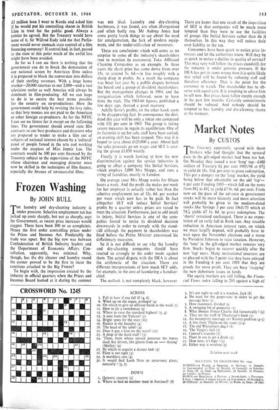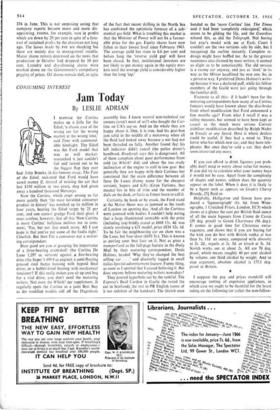Market Notes
By CUSTOS
MHE Treasury apparently agreed with those I brokers who had thought that the upward pace in the gilt-edged market had been too hot. On Monday they issued a new 'long' tap-£400 million of Treasury 61 per cent 1995/98 at 971 to yield £6 18s. I Id. per cent to gross redemption. This put a damper on the 'long' market, the yield being below that obtainable on the old 'tap'- 6 per cent Funding 1993-which fell on the news from 881 to 881 to yield £7 Os. 6d. per cent. From now on the pace of the advance in government stocks will be more leisurely and more attention will probably be given to the medium-dated stocks like Savings 3 per cent 1965/75 which at 74136 yields £7 Is. 8d. to gross redemption. The 'shorts' remained unchanged. There is no expec- tation of an early fall in Bank rate. Any sizeable reduction in American interest rates, on which we must largery depend, will probably have to wait upon the November elections and a move by President Johnson to raise taxation. However, the 'tone' in the gilt-edged market remains very firm. Stocks began to recover quickly after the new 'tap' news. Many institutional investors are so pleased withthe 5 point rise they have enjoyed in the Funding 6 per cent 1993 that they are greedy for more profit. They are busy 'stagging' the new debenture issues in herds.
The equity markets are still falling, the Finan- cial Times index falling to 293 against a high of 374 in June. This is not surprising seeing that company reports become more and more dis- appointing. FISONS, for example, turn in profits which are down by 20 per cent in spite of a fore- cast of sustained profits by the chairman not long ago. The losses made by PIM are shocking but these are mainly due to management trouble. Motor shares remain depressed on the news that production in October had dropped by 10 per cent. Laundry and dry-cleaning shares were marked down on the Government's compulsory pegging of prices. Oil shares remain dell, in spite
of the fact that recent drilling in the North Sea has confirmed the optimistic forecast of a sub- stantial gas field. What is troubling this market is that the Minister of Power will not fix a favour- able price for the gas. Equity shares have now fallen to their lowest level since February 1963. The average yield has risen to 6.6 per cent and before long the 'reverse yield gap' will have been closed. In fact, institutional investors are not likely to put money again in the equity mar- kets until the average yield is considerably higher than the long 'tap.'







































 Previous page
Previous page